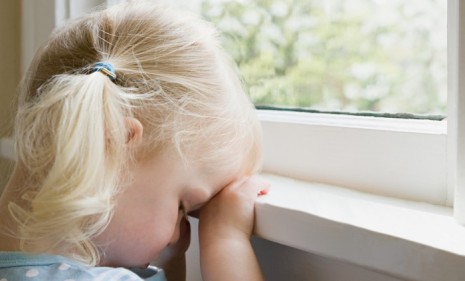5 signs your toddler is depressed
Preschool depression is becoming increasingly common, writes Pamela Paul in The New York Times Magazine. But you can stop it in its tracks

A free daily email with the biggest news stories of the day – and the best features from TheWeek.com
You are now subscribed
Your newsletter sign-up was successful
"Preschool depression" will likely soon join parents' "what-to-worry-about lexicon," alongside ADHD and other disorders unheard of 30 years ago, says Pamela Paul in an in-depth New York Times Magazine investigation. Though many experts maintain that toddlers are too psychologically immature to experience depression, a growing number of child psychologists believe it can hit children as young as 2 or 3 — and that treating the condition immediately can rewire the brain in a way that diminishes the problem later on. Here are five signs to look out for in your toddler:
1. Inability to experience joy or pleasure
Many symptoms of preschool depression "look a lot like those in older people," Paul says, citing research by Washington University School of Medicine child psychiatrist Joan Luby. But they manifest differently. For example, anhedonia, the inability to enjoy pleasurable activities (and, incidentally, the working title of Woody Allen's Annie Hall) shows up in adults as a loss of libido; in toddlers, it might be noted as an indifference to once-beloved toys.
The Week
Escape your echo chamber. Get the facts behind the news, plus analysis from multiple perspectives.

Sign up for The Week's Free Newsletters
From our morning news briefing to a weekly Good News Newsletter, get the best of The Week delivered directly to your inbox.
From our morning news briefing to a weekly Good News Newsletter, get the best of The Week delivered directly to your inbox.
2. Morbid play
Another adult depression symptom that gets "downsized" in toddlers is "suicidal ideation," says Paul. Instead of considering killing themselves, toddlers may "orchestrate scenarios around violence or death."
3. Frustrated outbursts that stem from sadness
Misery and abject sadness that lasts for long stretches, in different places, and with different people, is "the most obvious and pervasive symptom" of preschool depression, Paul says. One worrisome clue is that the child is frequently unable to process or resolve the sadness, and lashes out in frustration and self-criticism.
A free daily email with the biggest news stories of the day – and the best features from TheWeek.com
4. Anxiety
One "biological marker" of childhood depression is a rise in the stress-related hormone cortisol during fraught situations, and the failure of those levels to recover in normal fashion. In adults, cortisol spikes can also indicate an anxiety disorder, a condition that is often entwined with depression. Children with preschool depression are more than four times as likely to develop clinical anxiety by school age, according to Helen Egger, a Duke University child psychiatrist and epidemiologist.
5. Another behavioral disorder
Further complicating things, Egger has found that three-quarters of the depressed kids she's studied also have some other disorder such as ADHD and oppositional defiant disorder (ODD) — which are both symptomatically similar to depression. Luby discovered that 40 percent of her depressed-toddler subjects have ADHD or ODD, and those disruptive disorders often masked the depression.